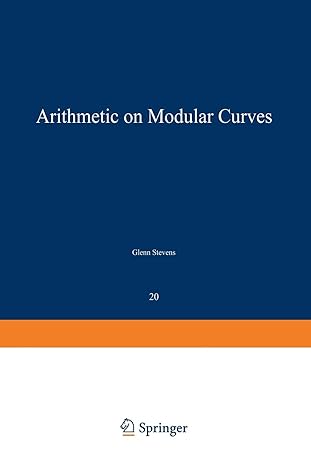Go back


Arithmetic On Modular Curves(1st Edition)
Authors:
G. Stevens

Cover Type:Hardcover
Condition:Used
In Stock
Include with your book
Free shipping: April 04, 2024Popular items with books
Access to 3 Million+ solutions
Free ✝
Ask 10 Questions from expert
200,000+ Expert answers
✝ 7 days-trial
Total Price:
$0
List Price: $11.76
Savings: $11.76(100%)
Book details
ISBN: 0817630880, 978-0817630881
Book publisher: Birkhauser
Get your hands on the best-selling book Arithmetic On Modular Curves 1st Edition for free. Feed your curiosity and let your imagination soar with the best stories coming out to you without hefty price tags. Browse SolutionInn to discover a treasure trove of fiction and non-fiction books where every page leads the reader to an undiscovered world. Start your literary adventure right away and also enjoy free shipping of these complimentary books to your door.
Arithmetic On Modular Curves 1st Edition Summary: One of the most intriguing problems of modern number theory is to relate the arithmetic of abelian varieties to the special values of associated L-functions. A very precise conjecture has been formulated for elliptic curves by Birc~ and Swinnerton-Dyer and generalized to abelian varieties by Tate. The numerical evidence is quite encouraging. A weakened form of the conjectures has been verified for CM elliptic curves by Coates and Wiles, and recently strengthened by K. Rubin. But a general proof of the conjectures seems still to be a long way off. A few years ago, B. Mazur [26] proved a weak analog of these c- jectures. Let N be prime, and be a weight two newform for r 0 (N) . For a primitive Dirichlet character X of conductor prime to N, let i\ f (X) denote the algebraic part of L (f , X, 1) (see below). Mazur showed in [ 26] that the residue class of Af (X) modulo the "Eisenstein" ideal gives information about the arithmetic of Xo (N). There are two aspects to his work: congruence formulae for the values Af(X) , and a descent argument. Mazur's congruence formulae were extended to r 1 (N), N prime, by S. Kamienny and the author [17], and in a paper which will appear shortly, Kamienny has generalized the descent argument to this case.
Customers also bought these books
Frequently Bought Together
Top Reviews for Books
Scott Vegas
( 5 )
"Delivery was considerably fast, and the book I received was in a good condition."










